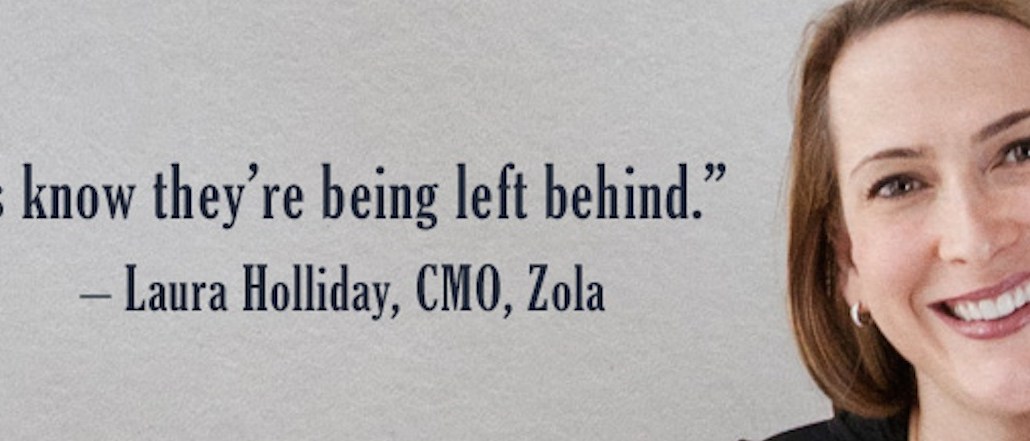Secure your place at the Digiday Publishing Summit in Vail, March 23-25

This is ThinkTank, a new series from Digiday where we quiz CMOs and brand chiefs on where their industry is heading.
Zola, the 2-year-old wedding registry startup with its eyes set on the $70 billion American wedding business, has only just now hired a chief marketing officer. Laura Holliday, who is three weeks into her new gig, joined Zola from Rent the Runway, where she led the startup’s rebranding effort. Previously, she spending time heading up marketing at J. Crew and Ralph Lauren.
Zola, founded by two former Gilt Groupe staffers Shan-Lyn Ma (CEO) and Kevin Ryan (co-founder of Gilt and Business Insider), is a wedding registry company that houses 300 brands and 10,000 products. Couples can register for gifts or cash (the company takes a cut for cash gifts). Digiday chatted with Holliday about her plans.
It’s an interesting time to be at Zola. You guys are approaching profitability. Why is it time for a CMO?
I think one of the most important things for any startup is to ensure that any product is as strong as it can be. Until you get to that point, marketing should be taking a back seat. It’s a waste of time to market a product that isn’t fantastic. Wisely, Zola has been focused on that for the past two years. The product is amazing now, so it’s time.
You’ve worked at a lot of legacy retailers. And a lot of those are being disrupted by new startups. Where did the old guard go wrong?
I have to be careful with that answer. [Laughs.] There are a lot of amazing retail companies out there spending decades building up great brands and beautiful merchandise, but when you get to a certain size as a company, it’s just hard to be nimble. You have legacy systems, you have complicated systems. Because they are so focused still on brick-and-mortar and merchandise, sometimes the cutting-edge tech isn’t prioritized. The nice thing about a company like Zola or Rent the Runway is that we’re very small and we’re full of people that get things done quickly and don’t get mired down in politics and the way things were.
So it’s internal challenges holding them back?
The intentions are correct for retailers. They do know that they’re being left behind a little bit. Big companies tend to spend a lot of time on big-company problems. Everything from working with a customer database that’s 10 years old or a code base that’s old. They’ll go back and rebuild all the pages of their site to be dynamic. It’s a huge amount of work to rebuild that and fix that. But all these new startups have no tech debt to catch up on. And it’s a small environment with a high level of trust, so there’s no time that needs to be wasted on internal selling.
What’s your big priority right now with Zola?
One of my main priorities is to create something with the brand identity to ensure it’s emotionally impactful. The product is amazing and beautiful, but the tone of the brand is very functional. We speak in a very straightforward way –this is what to do, here’s how to do it — and there isn’t a sense of emotion behind the brand. One of my first priorities is enhance that.
Where do agency relationships come into play?
We’re certainly looking into that. Right now we have a very small in-house team. We have some freelancers we work with. We’re certainly trying to be cognizant and careful of growing really thoughtfully. An agency is a safer way to grow than hiring 20 people. But it’s always best to get really great talent internally. Nobody is going to understand your brand better than a full-time employee.
What about traditional marketing?
We are a very modern company and early adopters are incredibly tech savvy. But at the same time, there are portions of the wedding-planning experience that are very old-school. Modern brides buy magazines. Even though we’re a tech company, print has a part in my marketing mix.
Are you a Pinterest cheerleader?
Pinterest should rename itself “wedding planning.” We’ve been talking to some other startups not in the wedding space about how Pinterest is working for them with promoted pins. It’s not working great for a lot of our friends. But for us, it works great. Because that is one of the first places brides go. We want to get to couples early on in the planning process.
But do guests trust you?
We need couples to register at Zola, but we also need a higher degree of brand awareness with guests. The default behavior is to go with the brand you already know. and then we compete with the brands with decades of equity.
So the Bloomingdales and the Targets are your biggest competitors?
Yes. It’s really the traditional retailers that are the biggest competitors. The ability for your aunt to go touch and feel a product. That’s not as important to you as couple, but you understand that it’s important to her. We need to convince our couples to register at Zola and strongly encourage guests to trust us.
More in Marketing

Pitch deck: How ChatGPT ads are being sold to Criteo advertisers
OpenAI has the ad inventory. Criteo has relationships with advertisers. Here’s how they’re using them.

Yahoo pauses IAB membership amid a series of quiet cost-saving measures
Yahoo pulls IAB board memberships, following job cuts as PE-owner reportedly reconsiders ad tech investments.

Target looks to e-commerce, advertising investments to help grow the business
Technology is one of the most important areas in which Target will invest with the hopes of returning to profit growth.





